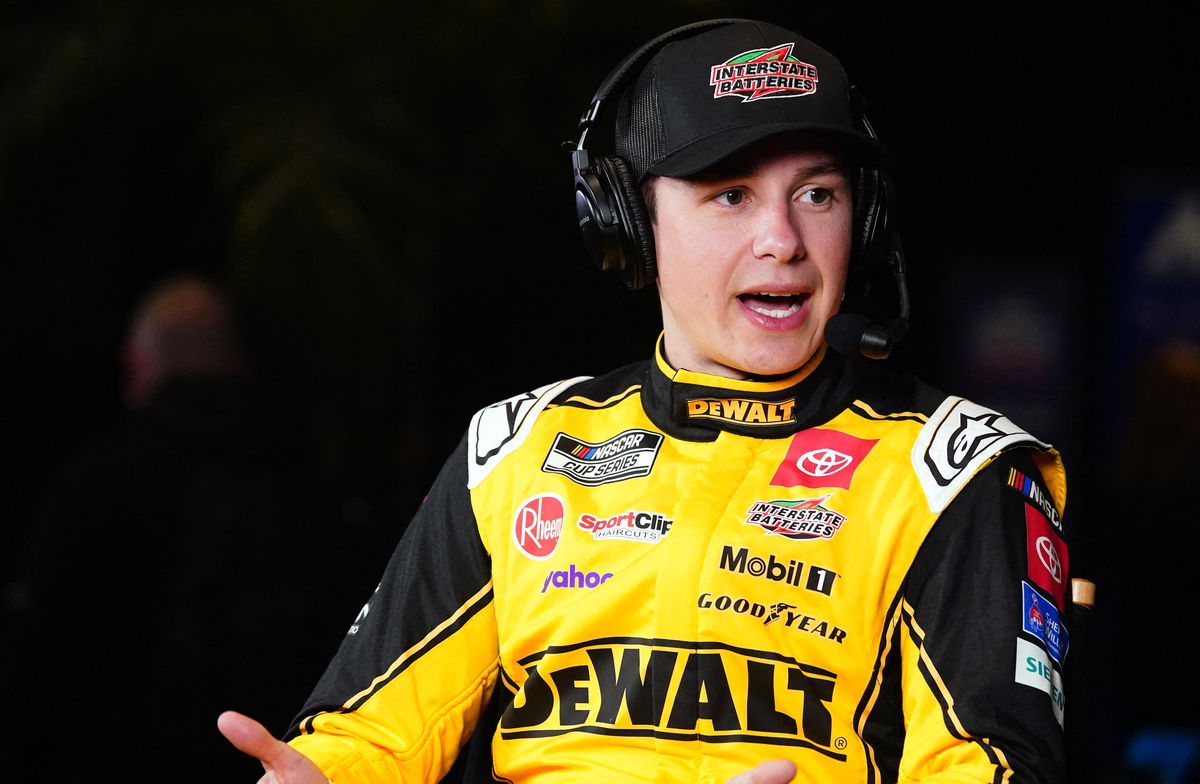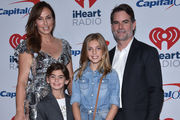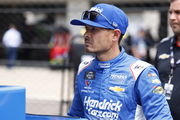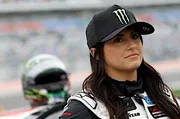
USA Today via Reuters
Feb 14, 2024; Daytona Beach, Florida, USA; NASCAR Cup Series driver Christopher Bell (20) speaks with reporters during media day at Daytona International Speedway. Mandatory Credit: John David Mercer-USA TODAY Sports

USA Today via Reuters
Feb 14, 2024; Daytona Beach, Florida, USA; NASCAR Cup Series driver Christopher Bell (20) speaks with reporters during media day at Daytona International Speedway. Mandatory Credit: John David Mercer-USA TODAY Sports
Christopher Bell found himself on the bitter end of things after NASCAR ruled him out of the championship race for a safety violation. The JGR driver managed to temporarily book himself a final 4 spot by pulling off a ‘Hail Melon 2.0’ move riding the wall at the Martinsville Speedway. But this wasn’t that big of a deal if we were to compare the race manipulation tactics that the Chevrolet drivers rolled with.
Watch What’s Trending Now!
Ross Chastain and Austin Dillon both stuck to their tasks of defending William Byron in the final 15 laps of the race. One position was the difference between Bell and Byron in deciding who would get the final ticket for Phoenix. Despite the HMS driver clearly being helped by his Chevy driver during the race, he was able to lock himself in. Meanwhile, Christopher Bell had to hit a pause on his championship dream despite a stellar 2024 season.
Although NASCAR did hit back on the teams and drivers with ejections and fines, the damage done to the #20 team was beyond any repair. Going by Bell’s words, he felt he was cheated in the way that NASCAR allowed Byron to go through despite the evidence of race manipulation.
ADVERTISEMENT
Did Christopher Bell deserve to be in the championship 4?
How differently would NASCAR have tackled this situation had Bell kept his car straight and not the wall? It is indeed tough to guess, but it certainly would’ve been an interesting one. Then they would have to decide which of the two drivers gained the most from the race manipulation tactics. And we’ve seen NASCAR making big calls this year with driver’s playoff qualification; it happened with Austin Dillon at Richmond.
So, NASCAR would’ve been on the spot to make a controversial call. But, despite the current ruling, Bell feels like he was forced into cahoots with Bubba Wallace on the last lap. Had the race been run fairly, he would’ve been in the championship 4 and not Byron. “I feel cheated out of a chance to compete for the championship. It all stems from what happened with 15-20 to go whenever the race got fixed and manipulated by Chevrolet that forced our hands to do what we did, and ultimately it forced me into a mistake on the last lap to get into the wall,” Bell said in an interview.
ADVERTISEMENT
He does have a case; his mistake riding the wall was an easy way for NASCAR to settle the affair. They did penalize the #23 team for manipulating the race, but despite their efforts, the #20 car couldn’t make the cut. Meanwhile, the #1 and the #3 helping the #24 certainly worked out in Chevy’s favor as they managed to get their driver in the Championship 4.
Bell further argued that if Byron didn’t have the support of the two Chevy cars defending him, he would’ve easily made it to the finale race. “I feel like I should be in the championship 4 yes. In the race, when manipulation happened, it was clear that I needed a position, and with the 23 dropping back, we got that position. Whenever we crossed the finish line, the 20 car was in. With the cars that were dealt, the 20 car was in position to make the championship event, and we’re not in it.”
ADVERTISEMENT
Christopher Bell says he felt cheated and he should be in the Champ 4 after what he viewed as race manipulation by the Chevrolets, which he indicated was the reason Bubba Wallace fell back and the result of the actions of the final lap. pic.twitter.com/BS0u8nmz3A
— Bob Pockrass (@bobpockrass) November 9, 2024
But why is the OEM partnership so important for the drivers across different teams? And why do they have such a big influence in trying to alter the outcome of the races? Brad Keselowski, the driver and co-owner of the RFK Racing team, had a pretty intriguing viewpoint to this question.
Top Stories
Footage Surfaces of Florida Police Arresting NASCAR Veteran Over Disturbing Public Misbehavior

Denny Hamlin Demands Immediate Apology From FOX Broadcaster After Michael Jordan’s Lawsuit Triumph

Jeff Gordon’s Wife Ingrid Vandebosch Shares Tearful Message Amidst Major Family Announcement

Kyle Larson’s Sprint Car Rivals Threatens Criminal Action Against Track Owner Over $15,000 Winner’s Purse

Hailie Deegan & Others Speculated to Fill NASCAR Seat After Star Driver’s Ugly Exit

ADVERTISEMENT
OEMs have a lot of influence on how teams run on the racetrack
Denny Hamlin, in his podcast, shared an inside story of how different the Chevy technical partnership is compared to 23XI Racing’s with JGR. He stated that Hendrick Motorsports has all the means and resources in terms of development and performance enhancement. Chevy funds the entire program, which enables them to pick and choose which teams can access the program and get the results on the racetrack.
So essentially, the Chevy drivers from Trackhouse Racing and RCR could’ve fallen out of favor had they not helped their big Chevy brother, Hendrick Motorsports. Meanwhile, Brad Keselowski shared his take on the situation, stating that the new teams or smaller groups have to rely on the OEM partners to get faster on the racetrack. And that’s just how Next-Gen racing has transformed the sport, for the good and the bad.
“The OEMs have never had more leverage than they have today in this sport, and when they have the leverage, they’re gonna wield it. I think the teams feel those obligations, sometimes even threats from manufacturers, and it’s made its way to now where you guys see it, where the fans see it. I suspect they’ll continue to grow unless they get checked.” Keselowski said this to Bob Pockrass.
ADVERTISEMENT
Brad Keselowski on why manufacturers have so much influence and what he saw and was thinking during the final laps at Martinsville. pic.twitter.com/KV51eraBUk
— Bob Pockrass (@bobpockrass) November 9, 2024
NASCAR did speak about making changes in the rule book about potential penalties to the OEM partners. So we will see how that turns out and whether or not their rules are strong enough to keep the OEMs in line.
ADVERTISEMENT
ADVERTISEMENT
ADVERTISEMENT

